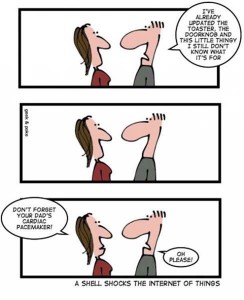
Picture this scene. Our Connected Living 2025 prediction that automatic brain reading will be developed comes true. Specialist brain implants become mainstream technology in just a decade, opening up all sorts of exciting possibilities, such as smartphones understanding your thoughts so you can ‘think’ an instruction. All of a sudden, an ingenious cyber-attacker detects a security vulnerability in the implant and hacks into millions of devices at once. At their fingertips they control the brainwaves of millions of people across the world. They instruct them to follow their every order as they build their global dictatorship…a Bond villain’s dream…
…It might sound like a superhero film, but as IoT technology in the mHealth sector develops, a similar scenario could become a reality; that’s if adequate security solutions aren’t implemented. Already, there have been concerns over pacemakers, many of which are equipped with wireless communications and could therefore be hacked. Former US vice-president, Dick Cheney, was famously fearful of terrorists assassinating him via his pacemaker. When researcher Marie Moe discovered her pacemaker could be hacked, she launched a campaign to compel the medical industry to codify a Hippocratic Oath for Connected Devices.
The oath calls for a collective statement recognizing that cybersecurity is an issue and urges the health sector to work with security researchers to develop robust solutions. The global association of mobile network operators (MNOs), the GSMA, recently released their IoT security guidelines – clearly it’s time for the health sector to do the same! In January, the FDA outlined steps medical device manufacturers should take to address cybersecurity risks in order to keep patients safe. Soon doctors might be prescribing security software updates rather than medicines…
Just like the Hippocratic Oath for Connected Devices calls for ‘Cyber Safety by design’, we strongly believe in ‘security by design’ when it comes to IoT security. We’ve developed a range of robust solutions for securing devices, the cloud environment, and lifecycle management. We believe this approach is crucial to securing the IoT-enabled health sector. You can read more about our industry-leading portfolio in our IoT Security e-book.
What do you think about the risk of cyber-attacks aimed at health wearables? Should there be a Hippocratic Oath for Connected Devices? Let us know your thoughts by tweeting to @Gemalto or @GemaltoM2M, or by posting a comment below.



